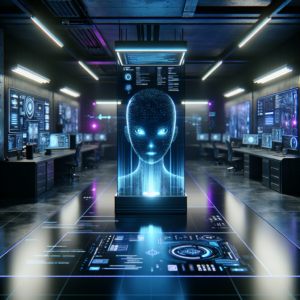AI Leaders Clash Over Safety and $100bn Stargate Project
In a rapidly evolving landscape dominated by artificial intelligence (AI), the tension between innovation and regulation has never been more palpable. The recent discussions surrounding the ambitious $100 billion Stargate project have ignited fierce debates among AI leaders, prompting a critical examination of safety protocols and ethical responsibilities in the deployment of AI technologies.
The Stargate Project: An Overview
The Stargate project, an initiative aimed at revolutionizing various sectors, including transportation, communication, and healthcare, has garnered significant attention within the tech community. With a projected budget of $100 billion, the project aims to leverage advanced AI to create a seamless integration of technology into everyday life. Advocates argue that it could pave the way for groundbreaking advancements, potentially transforming the way we interact with machines.
However, the project’s ambitious scope has also raised alarms regarding safety and ethical implications. As AI becomes increasingly integrated into critical systems, the question arises: how do we ensure that these technologies are safe for public use?
Safety Concerns in AI Development
Leading AI researchers and executives are divided on the issue of safety. Some argue for rigorous safety standards and regulations to mitigate risks associated with deploying AI systems in real-world scenarios. They contend that without strict guidelines, the potential for misuse or unintended consequences is too great. For instance, AI systems have been known to exhibit bias or make decisions that adversely affect marginalized communities. The lack of transparency in AI algorithms further complicates the landscape, as users often do not understand how or why decisions are made.
On the other hand, proponents of less stringent regulations argue that excessive oversight could stifle innovation. They believe that the potential benefits of the Stargate project outweigh the risks, positing that a collaborative approach between developers and regulators could yield better outcomes. This perspective emphasizes the need for a balanced approach that encourages innovation while ensuring safety.
The Role of Collaboration and Transparency
As the conversation around the Stargate project intensifies, the importance of collaboration among industry leaders, regulators, and communities becomes increasingly clear. Proactive engagement with stakeholders is critical in shaping a regulatory framework that is both effective and conducive to innovation. Engaging in open dialogues can help identify potential risks and establish protocols that address safety concerns while allowing for creative advancements.
Moreover, transparency in AI development can foster trust between developers and the public. By openly sharing information about AI systems and their decision-making processes, developers can alleviate fears and promote a culture of accountability. This shift towards transparency may also encourage public engagement, allowing for broader input and feedback on AI technologies.
Global Perspectives on AI Regulation
The challenge of regulating AI is not confined to a single nation; it is a global issue that requires international cooperation. Different countries have taken varied approaches to AI governance, with some advocating for strict regulations while others favor a more laissez-faire attitude. The European Union, for instance, is moving forward with comprehensive AI regulations that prioritize safety and ethical considerations. In contrast, countries like the United States are still negotiating the best path forward, often leaving room for more flexibility in AI development.
The Stargate project, with its global implications, highlights the necessity for a unified effort to address AI safety. International collaboration could lead to the establishment of shared standards that promote responsible AI development worldwide. This collaborative approach could also mitigate concerns about “AI races,” where countries might prioritize speed over safety in their pursuit of technological supremacy.
Public Perception and Ethical Responsibility
Public perception plays a critical role in the success of projects like Stargate. The potential for backlash against AI technologies due to safety concerns necessitates that developers actively address ethical responsibilities. An informed public is essential; thus, educational initiatives are vital to demystifying AI technologies and fostering understanding.
Moreover, ethical considerations should be at the forefront of AI development. This includes addressing issues of bias, data privacy, and the implications of autonomous systems. Developers and organizations must prioritize ethical frameworks that guide their practices, ensuring that AI technologies serve the greater good rather than perpetuating existing inequalities.
The Path Forward: Balancing Innovation and Safety
As the debates surrounding the Stargate project continue, the challenge lies in finding a balance between encouraging innovation and ensuring safety. The voices of AI leaders highlight the complexity of this issue, underscoring the need for a multipronged approach that incorporates collaboration, transparency, and ethical considerations.
Moving forward, it is essential for stakeholders to engage in constructive dialogues that drive the conversation around AI safety and innovation. By prioritizing safety without stifling creativity, the tech industry can work towards harnessing the potential of AI technologies while safeguarding public interests.
Conclusion
The clash among AI leaders over the safety and ethical dimensions of the $100 billion Stargate project reflects a broader conversation about the future of technology. As AI continues to infiltrate various aspects of society, the interplay between innovation and regulation will be crucial in shaping a harmonious coexistence.
Ultimately, the goal should be clear: to cultivate a future where AI technologies enhance human lives while being grounded in safety, ethics, and accountability. Through collaboration, transparency, and a commitment to responsible development, the vision of a transformative Stargate project can become a reality, benefiting society at large while addressing the inherent challenges that accompany AI advancements.



